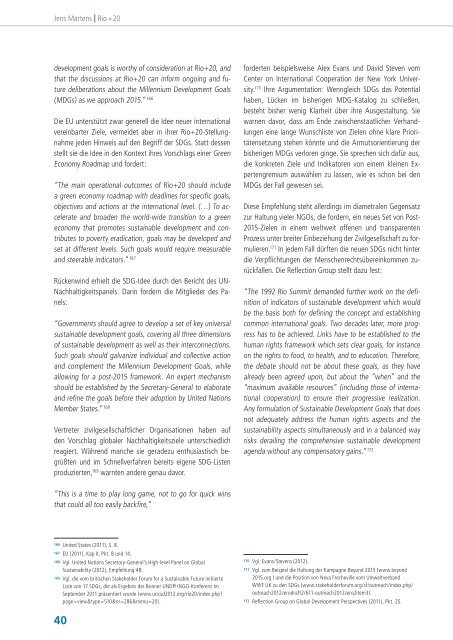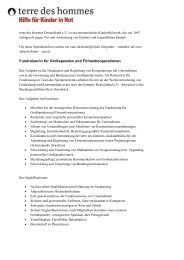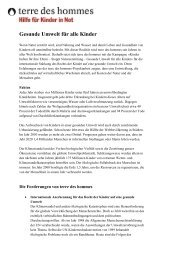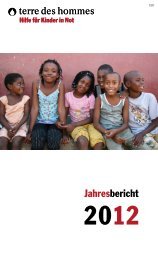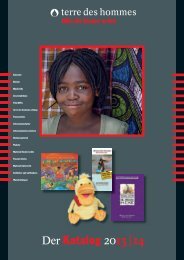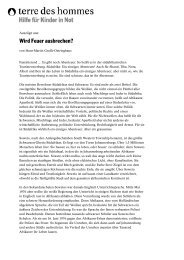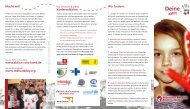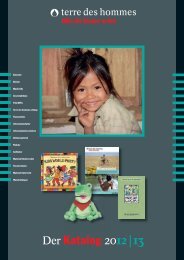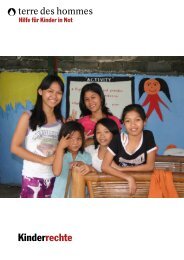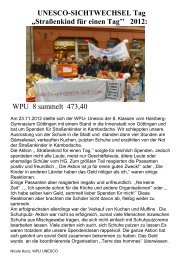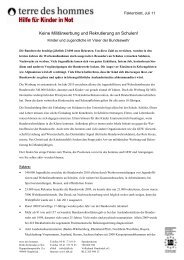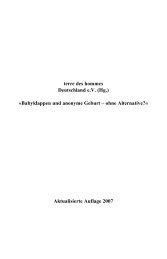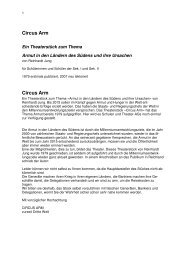Rio+20 Report - Terre des Hommes
Rio+20 Report - Terre des Hommes
Rio+20 Report - Terre des Hommes
Erfolgreiche ePaper selbst erstellen
Machen Sie aus Ihren PDF Publikationen ein blätterbares Flipbook mit unserer einzigartigen Google optimierten e-Paper Software.
Jens Martens | Rio + 20<br />
development goals is worthy of consideration at <strong>Rio+20</strong>, and<br />
that the discussions at <strong>Rio+20</strong> can inform ongoing and future<br />
deliberations about the Millennium Development Goals<br />
(MDGs) as we approach 2015.” 166<br />
Die EU unterstützt zwar generell die Idee neuer international<br />
vereinbarter Ziele, vermeidet aber in ihrer <strong>Rio+20</strong>-Stellungnahme<br />
jeden Hinweis auf den Begriff der SDGs. Statt <strong>des</strong>sen<br />
stellt sie die Idee in den Kontext ihres Vorschlags einer Green<br />
Economy Roadmap und fordert:<br />
“The main operational outcomes of <strong>Rio+20</strong> should include<br />
a green economy roadmap with deadlines for specific goals,<br />
objectives and actions at the international level. (…) To accelerate<br />
and broaden the world-wide transition to a green<br />
economy that promotes sustainable development and contributes<br />
to poverty eradication, goals may be developed and<br />
set at different levels. Such goals would require measurable<br />
and steerable indicators.“ 167<br />
Rückenwind erhielt die SDG-Idee durch den Bericht <strong>des</strong> UN-<br />
Nachhaltigkeitspanels. Darin fordern die Mitglieder <strong>des</strong> Panels:<br />
“Governments should agree to develop a set of key universal<br />
sustainable development goals, covering all three dimensions<br />
of sustainable development as well as their interconnections.<br />
Such goals should galvanize individual and collective action<br />
and complement the Millennium Development Goals, while<br />
allowing for a post-2015 framework. An expert mechanism<br />
should be established by the Secretary-General to elaborate<br />
and refine the goals before their adoption by United Nations<br />
Member States.“ 168<br />
Vertreter zivilgesellschaftlicher Organisationen haben auf<br />
den Vorschlag globaler Nachhaltigkeitsziele unterschiedlich<br />
reagiert. Während manche sie geradezu enthusiastisch begrüßten<br />
und im Schnellverfahren bereits eigene SDG-Listen<br />
produzierten, 169 warnten andere genau davor.<br />
“This is a time to play long game, not to go for quick wins<br />
that could all too easily backfire,“<br />
166 United States (2011), S. 8.<br />
167 EU (2011), Kap II, Pkt. 8 und 14.<br />
168 Vgl. United Nations Secretary-General’s High-level Panel on Global<br />
Sustainability (2012), Empfehlung 48.<br />
169 Vgl. die vom britischen Stakeholder Forum for a Sustainable Future initiierte<br />
Liste von 17 SDGs, die als Ergebnis der Bonner UNDPI/NGO-Konferenz im<br />
September 2011 präsentiert wurde (www.uncsd2012.org/rio20/index.php?<br />
page=view&type=510&nr=286&menu=20).<br />
40<br />
forderten beispielsweise Alex Evans und David Steven vom<br />
Center on International Cooperation der New York University.<br />
170 Ihre Argumentation: Wenngleich SDGs das Potential<br />
haben, Lücken im bisherigen MDG-Katalog zu schließen,<br />
besteht bisher wenig Klarheit über ihre Ausgestaltung. Sie<br />
warnen davor, dass am Ende zwischenstaatlicher Verhandlungen<br />
eine lange Wunschliste von Zielen ohne klare Prioritätensetzung<br />
stehen könnte und die Armutsorientierung der<br />
bisherigen MDGs verloren ginge. Sie sprechen sich dafür aus,<br />
die konkreten Ziele und Indikatoren von einem kleinen Expertengremium<br />
auswählen zu lassen, wie es schon bei den<br />
MDGs der Fall gewesen sei.<br />
Diese Empfehlung steht allerdings im diametralen Gegensatz<br />
zur Haltung vieler NGOs, die fordern, ein neues Set von Post-<br />
2015-Zielen in einem weltweit offenen und transparenten<br />
Prozess unter breiter Einbeziehung der Zivilgesellschaft zu formulieren.<br />
171 In jedem Fall dürften die neuen SDGs nicht hinter<br />
die Verpflichtungen der Menschenrechtsübereinkommen zurückfallen.<br />
Die Reflection Group stellt dazu fest:<br />
“The 1992 Rio Summit demanded further work on the definition<br />
of indicators of sustainable development which would<br />
be the basis both for defining the concept and establishing<br />
common international goals. Two deca<strong>des</strong> later, more progress<br />
has to be achieved. Links have to be established to the<br />
human rights framework which sets clear goals, for instance<br />
on the rights to food, to health, and to education. Therefore,<br />
the debate should not be about these goals, as they have<br />
already been agreed upon, but about the “when” and the<br />
“maximum available resources” (including those of international<br />
cooperation) to ensure their progressive realization.<br />
Any formulation of Sustainable Development Goals that does<br />
not adequately address the human rights aspects and the<br />
sustainability aspects simultaneously and in a balanced way<br />
risks derailing the comprehensive sustainable development<br />
agenda without any compensatory gains.“ 172<br />
170 Vgl. Evans/Stevens (2012).<br />
171 Vgl. zum Beispiel die Haltung der Kampagne Beyond 2015 (www.beyond<br />
2015.org ) und die Position von Neva Frecheville vom Umweltverband<br />
WWF UK zu den SDGs (www.stakeholderforum.org/sf/outreach/index.php/<br />
outreach2012zerodraft2/611-outreach2012zero2item3).<br />
172 Reflection Group on Global Development Perspectives (2011), Pkt. 25.


